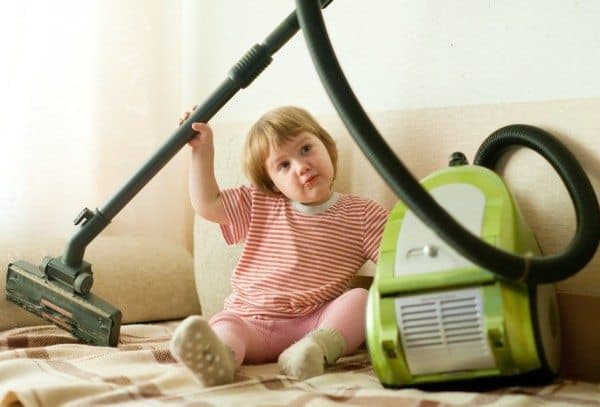
Chores & Young Children: When (& How) to Start
Oh, the irony of parenting: It’s undeniably hard work, and yet most of us are doing entirely too much of the work. We simply do too much for our kids, sometimes because it’s just easier or faster to do the task ourselves, or because we underestimate what our kids are capable of handling on their own.
And while I might be able to swoop through a room and put toys away in 10 minutes (versus the hour it takes my sons, that always results in toys getting shoved haphazardly in random places so nothing will ever be easily located again), doing that job for them is actually lazy parenting on my part. It’s their job, their responsibility, their contribution.
I doubt I need to sell anyone here on the benefits of chores: Chores teach children responsibility, give them an appreciation and respect for hard and/or tedious work, a sense of accomplishment and pride…while also teaching them important, essential life skills they will use throughout their lives. Kids NEED chores.
Have you ever met an adult who’s just plain…helpless? Like they have no idea how to scramble an egg or mow a lawn and seem unfamiliar with the concept that you can vacuum out a filthy car? Have you ever heard those stories about a newlywed learning that their MIL still does their spouse’s laundry?
I totally have, and I would like to 1) not send any more human beings like that into the real world, and 2) I AM NOT DOING LAUNDRY FOR THESE PEOPLE ANY LONGER THAN I ABSOLUTELY HAVE TO, SORRY.
That said, I’ve been guilty of not expecting “enough” from my young sons. Or not expecting enough consistency. The chore charts need occasional reevaluation and revisions, and they can also be implemented earlier than you may think.
Even the youngest children will benefit from an early introduction to chores. Between 12 and 24 months, your baby will become perfectly capable of following one-step requests and simple mimicry. Teach them to drop dirty clothes in the hamper, and give them a basket to put toys in. Once they’re walking, have them put spoons or cups out on the table for meals. At this age, these tasks tend to delight them, because they understand they’re doing things “like you.” They might not understand what happens to clothes in the hamper and have no idea where spoons and cups actually GO on the table, but your praise will go so, so far in teaching them that being helpful results in personal pride and happy faces.
Between 2 and 3 years old, you can begin expecting these early tasks to shift more into a set routine of chores. A sample chore list for a young toddler can look something like this:
- Put toys away
- Make their bed (pull up blanket, arrange toys and pillows, etc.)
- Put clothes in hamper or laundry area
- Put clean, folded clothes in drawers
- Help with spills and other messes (just plain towels/water or non-toxic cleaning products only)
Don’t expect perfection, and don’t tie a very young child’s chores to an allowance or other reward. This is about a basic contribution to their home environment, not something “extra” they earn a treat or money for.
Moving on to preschoolers (4 -5 years):
- Help feed pets
- Water plants
- Set and clear the table
- Load/unload the dishwasher (start with utensils and move on from there)
- Sort socks and put shirts on hangers (note that they should DEFINITELY be putting their own laundry away at this age, we’re just expanding on the basics from toddlerhood)
(And while not really a “chore” but in the realm of not “doing too much for them,” a preschooler is perfectly ready to prepare their own bowl of cereal, pour a drink and learn other non-cooking food prep tasks, like assembling a sandwich or portioning snacks in bowls.)
And now elementary-school aged kids, which is where I’ll need to tap out because this is as far as we’ve gotten in my house. But between 6 and 10, my oldest are expected to do all of the above, plus we gradually add in the following:
- Help with basic dinner prep
- Packing own lunches
- Prepare own breakfast & help younger siblings (pour drinks, put waffles in the toaster, pour syrup, etc.)
- Put groceries away
- Fully load/unload the dishwasher and help clean up the kitchen
- Sweep the floors
- Fetch the mail
- Help with gardening tasks (weeding, watering, harvesting)
- Clean their rooms (consistently and without help)
- Sort and put away own laundry
My older boys do get an allowance, but it’s not directly tied to their basic list of chores. We sort of view the allowance as a separate thing, more about money management, math, the value of a dollar, saving up for a goal purchase, stuff like that. If they go above and beyond our set expectations – like say, seeing a mess in the bathroom and cleaning it up themselves– I will reward them, though.
Finally, these lists are just basic suggestions. Your kids might be capable of more, even earlier. And looking over these lists I still see a lot of chores we enforce inconsistently, or still do ourselves out of speed/convenience. (The packing their own lunches one. I am guilty of slapping sandwiches and granola bars five minutes before the bus arrives more mornings than I care to admit.) It’s a process, but a worthy one.
What chores do you expect of your kids, and when?

